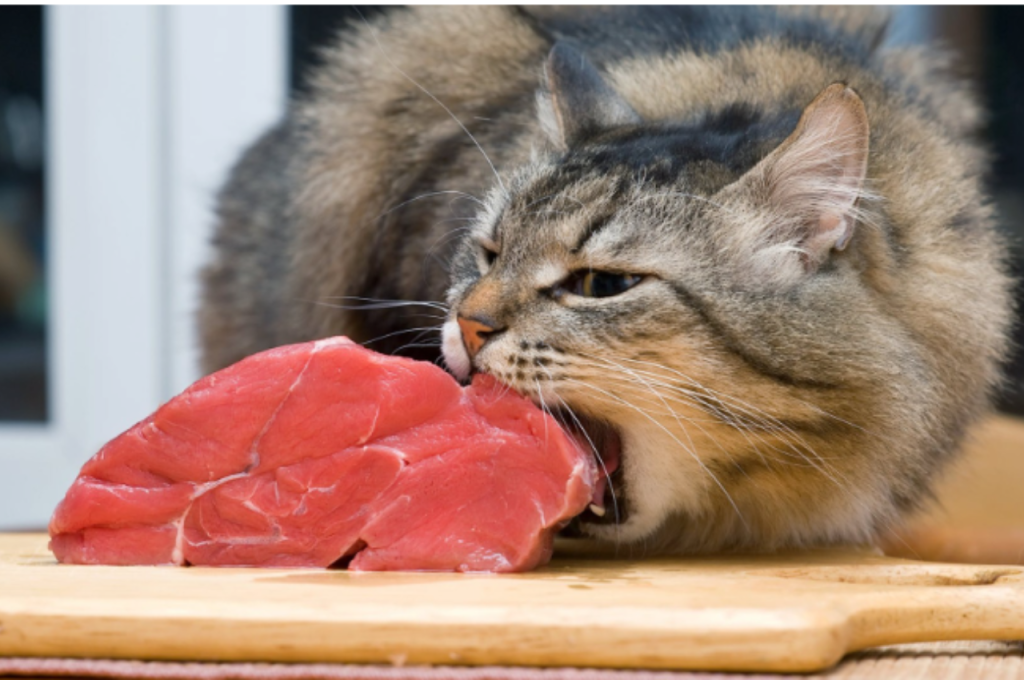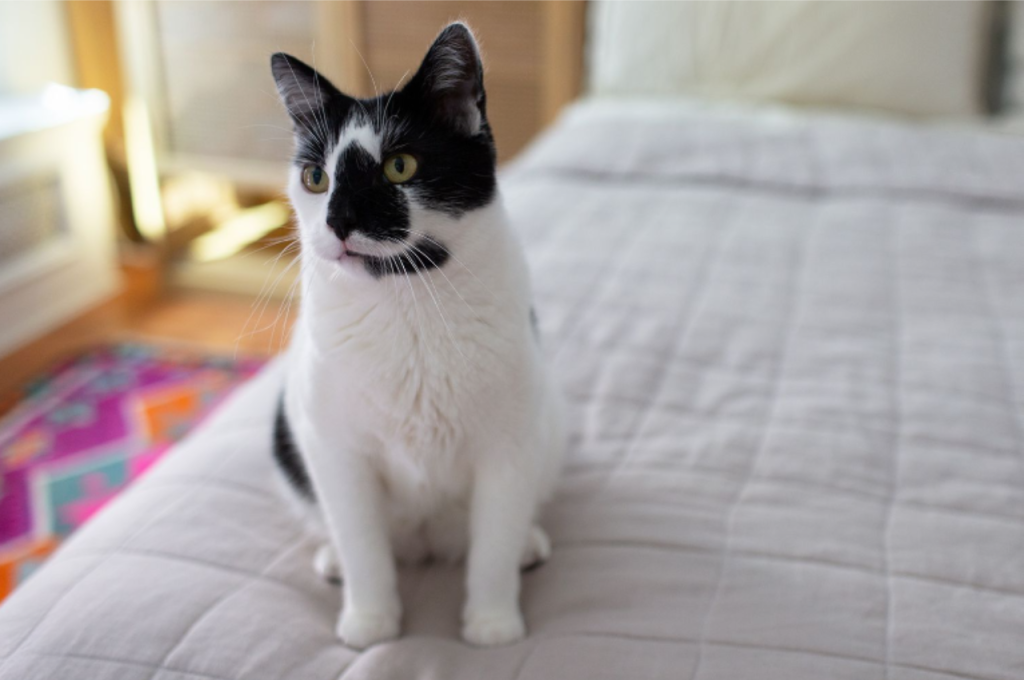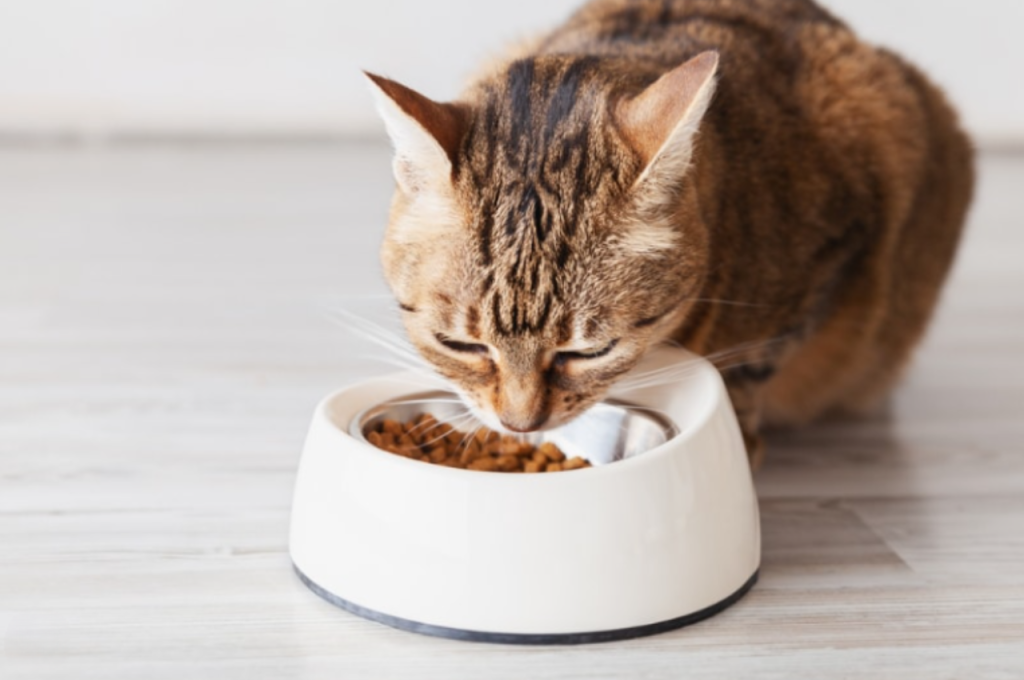Cats can’t eat beef due to the high risk of allergies and digestive issues associated with it. Beef is not suitable for cats because it often triggers allergies and causes digestive troubles.
While cats are obligate carnivores, relying on meat for optimal health, beef can lead to adverse reactions in their systems. These allergic reactions in cats can manifest through symptoms such as skin irritations, vomiting, diarrhea, or excessive scratching. Additionally, beef is hard for cats to digest, potentially leading to gastrointestinal problems.
Therefore, to ensure the well-being of our feline friends, it is recommended to avoid feeding them beef and instead provide them with other protein sources that are better suited for their dietary needs.
Nutritional Needs of Cats
Cats have unique nutritional needs that are different from other animals. As carnivores, their bodies are designed to thrive on a diet primarily consisting of meat. It is crucial for cat owners to understand the specific nutritional requirements of their feline companions to ensure their optimal health and well-being. In this blog post, we will discuss why cats can’t eat beef and delve into the carnivorous nature of cats along with their taurine requirement.

Carnivorous Nature of Cats
Cats are natural predators and their digestive systems are perfectly adapted for consuming animal-based foods. Their sharp teeth, strong jaws, and short digestive tracts all reflect their evolution as obligate carnivores. Unlike omnivorous animals, cats lack the necessary enzymes to break down and utilize plant matter efficiently. Hence, their bodies rely on meat as the primary source of essential nutrients.
The carnivorous nature of cats allows them to efficiently extract nutrients, such as proteins, fats, and amino acids, from meat. These nutrients are essential for their growth, energy production, and overall health. While cats can indeed eat small amounts of select fruits and vegetables, their bodies lack the ability to fully digest and absorb the nutrients from plant sources.
Taurine Requirement
Taurine is a crucial amino acid that plays a vital role in a cat’s overall health. Unlike humans and other animals, cats cannot produce adequate amounts of taurine on their own. Therefore, it is essential for their diet to include a sufficient amount of taurine-rich animal proteins.
Taurine deficiency in cats can lead to severe health issues including retinal degeneration, reproductive problems, heart disease, and impaired immune function. As beef is a relatively poor source of taurine compared to other animal proteins, such as poultry or fish, it is not an ideal choice for a cat’s primary diet. While beef can be included occasionally and in small amounts, it should not be relied upon as the main protein source.
Instead, it is crucial to provide cats with premium quality cat food that is specifically formulated to meet their nutritional needs. These specialized cat foods are carefully balanced to contain the necessary proteins, fats, vitamins, and minerals that are essential for a cat’s optimal health.
Digestive System Differences
Cats have a unique digestive system that sets them apart from other animals, including their ability to process certain types of food. Understanding the digestive system differences between cats and other animals helps shed light on why cats can’t eat beef.
Processing Meat Proteins
Cats have a heightened ability to metabolize and utilize animal proteins. Their digestive system is designed to break down and absorb protein from sources like fish, poultry, and even small rodents. This is mainly due to their strict carnivorous nature and an evolutionary adaptation that allows them to extract essential nutrients from animal-based proteins.
Limited Ability to Digest Beef
When it comes to beef, however, cats have a limited ability to digest it. Beef contains a high level of complex proteins that can be difficult for a cat’s digestive system to break down and absorb effectively. The specific enzymes required to digest beef are not as prominent in a cat’s digestive tract, making it challenging for them to process this type of meat.
Allergies and Sensitivities
Cats, like humans, can have allergies and sensitivities to certain foods. In the case of beef, it’s important to be aware that it may not be a suitable protein source for all cats. Understanding the impact of beef on a cat’s health can help pet owners make informed decisions about their feline friend’s diet.
Common Beef Allergies in Cats
Cats can develop allergies to beef, just like humans can. Common symptoms of a beef allergy in cats include skin issues, such as itching, redness, and rashes, as well as gastrointestinal problems like vomiting and diarrhea. Chronic exposure to beef can escalate the severity of these symptoms, making it crucial to identify and address any potential allergies promptly.

Impact On Cat’s Health
When a cat has an allergy or sensitivity to beef, consuming this protein can have a significant impact on their overall health. Persistent exposure to beef can lead to chronic skin irritation, compromised digestive health, and a weakened immune system. Ultimately, it may affect the cat’s well-being and quality of life, emphasizing the importance of tailoring their diet to suit their individual needs.
Risk of Bacterial Contamination
Beef can pose a risk of bacterial contamination for cats. Cats are susceptible to bacteria such as E. coli and salmonella, which can be present in raw or undercooked beef. Consuming contaminated beef may lead to illness or food poisoning in cats, hence it is not recommended for their diet.
Salmonella and E. Coli Concerns
Cats are well-known for their love of meat, but there is one type of meat that should be off-limits to them: beef. This is because beef can pose significant risks of bacterial contamination to our furry feline friends.
Salmonella and E. coli are two common bacteria that can thrive in raw or undercooked beef. These bacteria can be harmful to both cats and humans, causing severe gastrointestinal issues and, in some cases, even leading to more serious health complications.
Salmonella is a bacterium that can be found in the intestines of animals, including cows. When the meat is not properly cooked, the salmonella bacteria can survive and make its way into the digestive system of cats, causing diarrhea, vomiting, and abdominal pain. It can also spread to humans through contact with contaminated surfaces or through cross-contamination during food preparation.
E. coli, another bacterium present in beef, can produce toxins that are harmful to cats. Consumption of raw or undercooked beef contaminated with E. coli can result in symptoms such as severe diarrhea, dehydration, and, in extreme cases, kidney failure. It’s important to note that even cooked beef can still carry traces of E. coli if the meat has not been properly handled and cooked at the appropriate temperature.
Food Safety Issues
Ensuring proper food safety is crucial when it comes to protecting both our pets and ourselves. In the case of beef, it is essential to take extra precautions due to the higher risk of bacterial contamination compared to other meats. Here are some important food safety measures to consider:
- Cook meat thoroughly: Make sure to cook beef to an internal temperature of at least 160°F (71°C) to kill any potential bacteria.
- Avoid raw or undercooked beef: Refrain from feeding your cat raw or undercooked beef, as it can increase the risk of bacterial infection.
- Practice good hygiene: Wash your hands thoroughly with soap and water after handling raw meat, and clean any surfaces or utensils that come into contact with the raw beef.
- Store meat properly: Keep raw beef separate from other foods to prevent cross-contamination, and refrigerate or freeze beef promptly to slow bacterial growth.
By following these food safety guidelines, you can reduce the risk of bacterial contamination not only in the beef you consume but also in any potential meat scraps or leftovers that could be harmful to your cat if ingested.
Remember, your cat’s health is of utmost importance, and being aware of the risks associated with certain foods, like beef, can help to keep them safe and happy.
Obesity and Health Concerns
Cats should avoid beef due to potential risks The high fat content in beef can lead to obesity and various health issues.
High Fat Content in Beef
Beef contains excessive amounts of fat. Cats are not efficient digesting this fat content.
Weight Management Challenges
Feeding cats beef can cause obesity. Obesity leads to diabetes, heart disease, and other health problems.
Alternative Protein Sources
Cats cannot eat beef due to their specific dietary requirements. However, there are alternative protein sources available that fulfill their nutritional needs effectively.

Suitable Protein Options for Cats
When selecting protein sources for your feline companion, it’s crucial to choose options that meet their nutritional requirements and support their overall health.
Balanced Diet Recommendations
Balanced diet recommendations are crucial for cats to maintain their health. Ensuring they get the right nutrients is key.
Frequently Asked Questions On Why Can’t Cats Eat Beef?
Certainly! Here are some questions about why can’t cats eat beef:
Why can’t cats eat beef?
Cats lack the necessary enzymes to properly digest beef. Beef can also lead to digestive issues and allergic reactions in cats. Furthermore, beef often contains high levels of fat which can contribute to obesity and other health problems in felines.
Is beef harmful to cats?
Yes, beef can be harmful to cats. It is difficult for cats to digest beef which can lead to gastrointestinal issues. Additionally, beef can cause allergic reactions in some cats, leading to skin problems, vomiting, and diarrhea.
What should I feed my cat instead of beef?
Instead of beef, consider feeding your cat high-quality, protein-rich cat food that is specifically formulated for feline nutrition. Look for cat food that contains meat-based proteins such as chicken, turkey, or fish to meet their dietary needs.
Can cats eat any type of beef?
It’s best to avoid feeding your cat any type of beef, including raw or cooked beef. Cats are obligate carnivores and require specific nutrients found in other types of meat that are better suited to their digestive systems.
Conclusion
While beef may be a common food for humans, it is not suitable for cats. Feeding cats beef can lead to digestive issues, nutrient imbalances, and potential risks from bacteria or parasites. It’s crucial to provide a balanced and appropriate feline diet that includes high-quality cat food specifically formulated for their nutritional needs.
By understanding the unique dietary requirements of cats, we can ensure their health and well-being for years to come.
